
“Once we rid ourselves of traditional thinking we can get on with creating the future” J. Bertrand
Transformation. Powerful word, that implies profound change, getting out of comfort zone and going through the challenges. Even with the scrupulous mathematical calculation it is not possible to guarantee the positive end result of the transformational change. And this is where it gets more exciting, as implies challenging breakthroughs. It doesn’t matter whether we talk about a transformation of a person, union, community or a company. In my opinion, basic principles can be applied to any unit, with further customised/ individual approach. At the core stays the Value, Purpose and Growth – same principles applied to the transformation of the individual.
Transformation, especially in our world of unprecedented disruption and market turbulence, revolves around the need to generate new value, create new resources and/or new potentials. It unlocks new opportunities, underpins new growth, and delivers new efficiencies.
Today, Digital Transformation is risk No. 1 in the business world. $1.3 trillion was spend on digital transformation last year, from which $900 billion went to waste. (WSJ, Dec., 5, 20108)
What is business transformation?
It is the opportunity to define a bold ambition that goes beyond incremental change – the opportunity to rethink your business and operating models to deliver breakthrough value. It involves strategic decisions that affect where you’ll grow, how your organization operates, and what kinds of performance improvements you can expect”. Deloitte
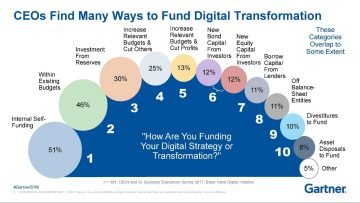
Transformation is necessary as it is a step in organisation development to stay afloat and survive in today’s disruptive business environment.
If it took five or six years in the past in order to complete many initiatives, currently it takes a year or less to implement them. Therefore, companies struggle with information overload, compressed timeframes and decisions that affect all aspects of strategy and operations.
As suggested by Deloitte, there are steps that enable successful transformation:
1. Begin with a strategy-informed ambition.
Implies clear vision introduced by the company leaders, translating a strategic goals into realistic transformation ambition, main goal of which is to capture a value.
2. Lead with capabilities.
Focus on capabilities that will differentiate the company and drive your competitive advantage. Prioritizing first steps, it is vital to define mission, insights, integration, processes, technology and talent. Thus, execution meets the value of the transformation ambition.
3. Drive to Value.
Be explicit in how to create value and how it is going to be connected to execution. Failure to define value will lead to the unsuccessful execution of the transformation.
4. Be agile and flexible.
Disruptive mindset, innovation and agility – are the cornerstone for transformation initiative as they provide early bottom-line benefits that can help fund transformation execution.
Ability to be able to continue to evolve in the future – is the recipe for victory and it implies agility, flexibility and resilience.
5. Invest in program talent
Right talent is selected by the right leader and it is the cornerstone for the success of the transformation. A visionary with strong focus, influence and credibility will be capable to shape the entire process. Therefore, ROI is directly correlated to the calibre and dedication of the talent aligned to the transformation. The skills and experience developed through the transformation process will help sustain the value over time afterwards.
6. Build in sustainability
This is a long-term process that requires first of all Data, including management of attitudes, behaviours and engagement. This will enable to develop right capabilities, competencies and change-adaptive culture. It is fundamental in order to create sustainable change. And after that the real value emerges. Role of the leader is vital and the way the transformation is organised through fostering an adaptive organization by engaging and empowering other leaders within the organization.
We can witness this engagement through the real cases occurring nowadays that are successful and motivating.
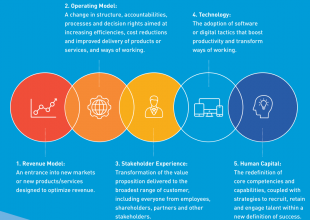
Successful Cases of Company Transformation – Top 20
The idea of prioritizing stakeholders over shareholders is not new in the business world. Although it was actively discussed and promoted, not even big corporation could afford this swift transition. On Aug 19, 2019, 181 CEO signed a commitment to lead their companies for the benefit of stakeholders., as per the press release of the Business Roundtable. Among them are JPMorgan Chase & Co, Vanguard, Johnson&Johnson.
The main principles are:
- Delivering value to stakeholders
- Investing in employees
- Dealing fairly and ethically with suppliers
- Supporting the communities in which we work
- Generating long-term value for shareholders
“Focusing on purpose rather than growth, is precisely, what drives growth while also keeping employees engaged in executing worthy mission”
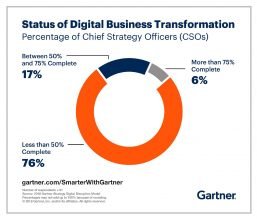
It is important to understand that strategic transformation is not a short term process as it requires to adapt a core business to disruptive change while also create new growth around new products, services or business models. And it requires time to become successful.
In order to understand dynamic of transformation it is vital to evaluate success not trough the usual metrics like revenue, market value or other criteria, but trough the three categories:
- New Growth: how successful has the company been at creating new products
- Repositioning the Core: how effectively has the company adapted its traditional core to disruptions in its markets?
- Financials: has the company posted strong financial and stock maret performance, or has it turned around its business from losses or slow growth to get back on track?
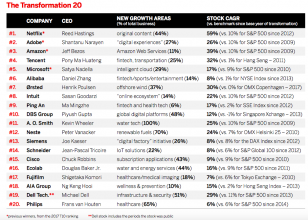
Dual Transformation and Threatens that derail any transformation
What is Dual Transformation?
Risks that threaten to derail any transformation are:
- Crisis of Commitment
- Crisis of Conflict
- Crisis of identity
The first crisis takes place because of fear and lack of commitment, while the second is mainly because of the disproportional share of investment and scarce capital investment.
The third crisis, crisis of identity, occurs when the organisation has a vague vision and questions its mission: if we’re not that company any more, then what are we?
However, before reaching any of these crisis, the company first face the Crisis of Complacency, when the existing data misleads information about market disruption, poor customer data focused on cheaper products, or business model constraints.
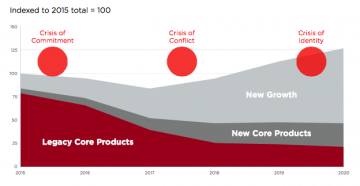
Considering, all above-mentioned, organisations realised that business transformation is too risky, but don’t forget that you either taking a risk or loosing a chance. A chance to create new ecosystem that gives you the opportunity to grow in completely new areas, pioneering new markets for a long time to come.
References:
Behnam Tabrizi, Ed Lam, Kirk Girard and Vernon, Irvin, March 13, 2019, HBR, Digital Transformation is not about Technology,
Mengqi Sun, Dec 5, 2018 , SWJ, Business predict Digital Transformaiton to be the biggest risk in 2019,
Scott D. Anthony, Alasdair Trotter and Evan I. Schwartz, September 24, 2019, HBR, The top 20 Business transformations of the last decade,
Deloitte , Thinking big with business transformation, Six keys to unlocking breakthrough value
Scott D. Anthony, Alasdair Trotter, Rob Bell and Evan I. Schwartz, The Transformation 20, Strategic Change rankings for 2019, Innosight Strategy and Innovation at Huron

Fidan Aliyeva is a VP of R&D for ztudium. She is specialised in leadership, strategy, Innovation, People Management, behavioural economics, digital transformation. She writes for intelligenthq.com, openbusinesscouncil.org and hedgethink.com. Fidan Aliyeva’s background experience is in senior level leadership, project management, having coordinated operations for ztudium holdings and its multiple platforms and projects since 2011. With a career background in international Energy, Oil and Gas industry, Fidan has been working with big energy Multinationals close to CEOs and Boards project managing global projects. Fidan has an MBA in Oil and Gas Management from the University of Dundee, Scotland. In the last years she has been working, researching and writing about micro and macro trends in business, energy, oil and gas industries. She has a passion for leadership, strategy, geopolitical, environmental, tech and other global regulatory concerns with interest in behavioural psychology. Her current study involves EnioStyle – brand new socio-cultural theory on informational metabolism, psyche-typing, energy-informational exchange between people and nature based on analytical psychology, neuro-linguistic programming, transactional analysis and socionics. Application of EnioStyle to business challenges as a decision-making technique – is her new frontier for exploration.


























